Bibliography
- Peter Broucek : " Merkl, Rudolf Frh. von ". In: Österreichisches Biographisches Lexikon 1815–1950 (ÖBL). Vol. 6, Austrian Academy of Sciences , Vienna 1975, ISBN 3-7001-0128-7 , p. 231.
Freiherr Rudolf von Merkl (28 March 1831 - 22 January 1911) was a general in the Common Army of Austria-Hungary and briefly served as Imperial and Royal Minister of War in 1893.
Merkl was born in Vienna in 1831 and entered the military in 1849. served as an officer of the general staff in Lombardy-Venetia during the Austro-Prussian War of 1866. From 1872, he was leader of the 5th division of the Imperial ministry of war, where he was responsible for the preparations for the Austro-Hungarian campaign in Bosnia and Herzegovina in 1878.
From 1885 to 1888, Merkl served as a section chief in the ministry of war and he was interim minister of war from 5 August to 23 September 1893, following the sudden death of Ferdinand von Bauer. He retired from service in 1899 and died in Vienna in 1911.
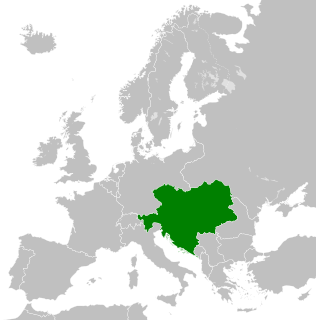
Austria-Hungary, often referred to as the Austro-Hungarian Empire, the Dual Monarchy, or Austria, was a constitutional monarchy and great power in Central Europe between 1867 and 1918. It was formed with the Austro-Hungarian Compromise of 1867 in the aftermath of the Austro-Prussian War and was dissolved shortly after its defeat in the First World War.
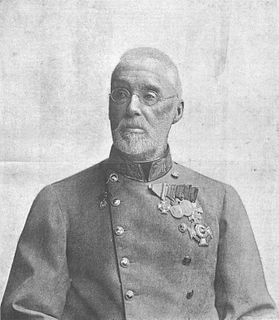
Archduke Albrecht Friedrich Rudolf Dominik of Austria, Duke of Teschen, was an Austrian Habsburg general. He was the grandson of Emperor Leopold II and one of the chief military advisors of Emperor Francis Joseph I. As Inspector General for 36 years, he was an old-fashioned bureaucrat who largely controlled the Austro-Hungarian Army and delayed modernization. He was honored with the rank of Field Marshal in the armies of Austria-Hungary (1863) and Germany (1893).

The Austro-Hungarian Army was the ground force of the Austro-Hungarian Dual Monarchy from 1867 to 1918. It was composed of three parts: the joint army, the Imperial Austrian Landwehr, and the Royal Hungarian Honvéd.

Freiherr Ladislaus Hengelmüller von Hengervár, was an Austro-Hungarian diplomat of Hungarian origin who was a long-term Ambassador at Washington D.C., throughout many Presidential administrations including those of William McKinley, Theodore Roosevelt and William Taft.

Ernest Karl Franz Joseph Thomas Friedrich von Koerber was an Austrian liberal statesman who served as prime minister of the Austrian portion of Austria-Hungary from 1900 to 1904 and again in 1916.
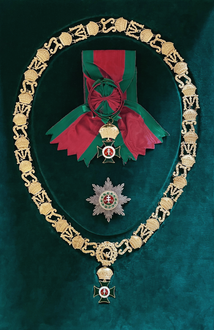
The Order of Saint Stephen was an order of chivalry founded in 1764 by Maria Theresa. In 1938, Miklós Horthy took the rights and activities of Grand Master as Regent of Hungary. The name of the Order changed to the Royal Hungarian Order of Saint Stephen. The Order was terminated at the time of the proclamation of the Second Hungarian Republic in 1946. It was recreated in 2011 as the Hungarian Order of Saint Stephen, and to this day remains the highest order in Hungary.

Paul Gautsch Freiherr von Frankenthurn was an Austrian statesman who served three times as Minister-President of Cisleithania.
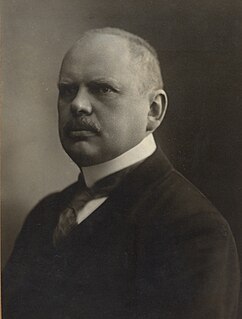
Maximilian Hussarek von Heinlein, ennobled to the rank of Baron (Freiherr) in 1917, was an Austrian statesman who served as the penultimate Minister-President of Cisleithania in the last stage of World War I, for three months in 1918.

The Imperial and Royal Minister of War, until 1911: Reich Minister of War (Reichskriegsminister), was the head of one of the three common ministries shared by the two states which made up the dual monarchy of Austria-Hungary from its creation in the Compromise of 1867 until its dissolution in 1918.

Rudolf Stöger-Steiner Freiherr von Steinstätten was a colonel general in the Austro-Hungarian army and served as the last Imperial Minister for War not only to the Austro-Hungarian Empire but also to the ancient Habsburg monarchy which sat at its head.
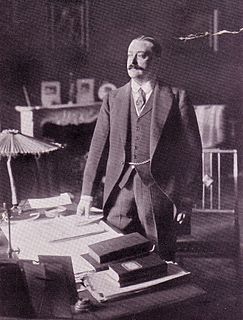
Count Frigyes Szapáry de Szapár, Muraszombat et Széchy-Sziget, was an Austro-Hungarian diplomat of Hungarian origin serving as ambassador at St. Petersburg at the outbreak of World War I and who played a key role during the July Crisis of 1914.

Count Stephan Burián von Rajecz, commonly called: "Baron von Burian" or, later, "Count Burian" in English language press reports; (titles from 1900, Freiherr; from 1918, Graf) was an Austro-Hungarian politician, diplomat and statesman of Hungarian origin and served as Imperial Foreign Minister during World War I.
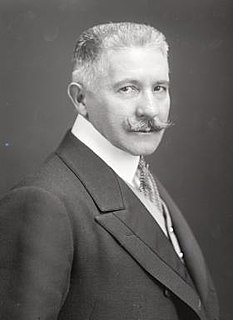
Wladimir Rudolf Karl Freiherr Giesl von Gieslingen was an Austro-Hungarian general and diplomat during World War I, most famous for delivering the ultimatum to the Serbian government during the July Crisis of 1914.
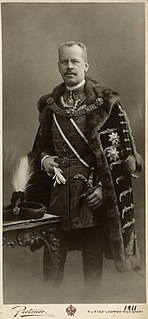
Kajetan Mérey von Kapos-Mére, was an Austro-Hungarian diplomat of Hungarian origin serving as ambassador at Rome at the outbreak of World War I.

The Imperial and Royal Foreign Ministry was the ministry responsible for the foreign relations of the Austro-Hungarian Empire from the formation of the Dual Monarchy in 1867 until it was dissolved in 1918.

Count Eduard Clam-Gallas was an Austrian general. He was the eldest son of Count Christian Christoph Clam-Gallas (1771–1838), patron of Beethoven, and Countess Josephine Clary-Aldringen (1777–1828).

The Royal Hungarian Honvéd or Royal Hungarian Landwehr, commonly known as the Honvéd, was one of the four armed forces of Austria-Hungary from 1867 to 1918, along with the Austrian Landwehr, the Common Army and the Imperial and Royal Navy. The term honvéd was used to refer to all members of the Hungarian land forces in 1848-49, but it was also used to refer to enlisted private soldiers without a rank.
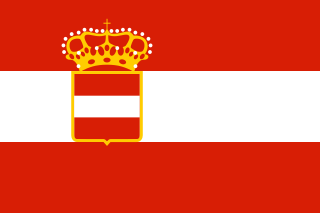
The Supreme Commander of the Imperial and Royal Armed Forces was the ultimate authority of the Austro-Hungarian Armed Forces – which comprised the Army, Navy and Aviation Troops of Austria-Hungary.

Balogh von Mankobük or Balog de Manko Bückin its present Germanized form, mankóbükiBalogh in Hungarian, was a Austro-Hungarian noble family from the Habsburg monarchy, originally from the region of Sopron / Ödenburg.
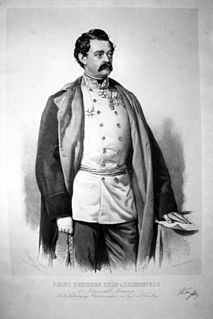
Franz Kuhn von Kuhnenfeld was an Austro-Hungarian military officer who fought against Giuseppe Garibaldi in the wars of Italian independence and served as Imperial and Royal Minister of War from 1868 to 1874. During his term, a unified system of conscription for both Cisleithania and Transleithania was introduced, corporal punishment in military service was abolished, and the Franz-Josephinian Land Survey was initiated. He was a supporter of the Austro-Hungarian polar expedition and an opponent of the Austria-Hungary's 1879 alliance with the German Empire.